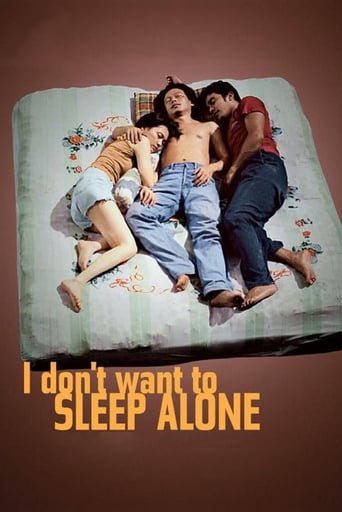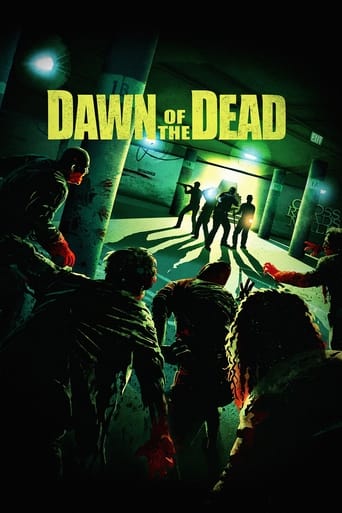

I Don't Want to Sleep Alone (2007)
Rawang, an immigrant from Bangladesh living in awful conditions, takes pity on a Chinese man, Hsiao-kang, who is beaten up and left in the street. Rawang lovingly nurses him on a mattress he found. When he is almost healed, Hsiao-kang meets the waitress Chyi. His love for Rawang is put to the test.
Watch Trailer
Cast


Similar titles
Reviews
It's the kind of movie you'll want to see a second time with someone who hasn't seen it yet, to remember what it was like to watch it for the first time.
Although I seem to have had higher expectations than I thought, the movie is super entertaining.
Very good movie overall, highly recommended. Most of the negative reviews don't have any merit and are all pollitically based. Give this movie a chance at least, and it might give you a different perspective.
It is encouraging that the film ends so strongly.Otherwise, it wouldn't have been a particularly memorable film
Tsai Ming Liang's "I Don't Want to Sleep Alone" is yet another of those Spartan-like, minimalist Asian films (this one happens to be Chinese) that is composed almost entirely of single-take medium and long shots (this movie would have made Andre Bazin and his fellow theorists at Cahiers du Cinema jump for joy, or, at the very least, purr with contentment). The problem with such a style, beyond testing the patience of the audience, is that it distances us so much from what is happening on screen that we soon become dispassionate observers rather than the engaged participants we need to be if we are to become fully enveloped in the story. In fact, most of the time we can't figure out who anybody is or why we should be interested in anything that is going on in their lives. If this movie proves anything, it is just how essential close-ups and inter-scene cutting can be in helping us to identify with and care about a character and the situation he's going through.As far as I can tell, the theme is about a handful of urban youth who feel isolated and alienated from one another and the world around them, but who are taking some faltering steps towards reaching out and bridging that gap, mainly through touching. But the almost total lack of dialogue and the chillingly clinical style of film-making make it frankly impossible for us to tell WHAT the movie makers' intentions might be.There are a few erotically-charged moments in the film, but overall "I Don't Want to Sleep Alone" is an excursion into tedium that gives "art films" a bad name.
What would you do l if you had to share an old flea-ridden mattress with a stranger in a scorching hot and humid Kuala Lumpur? How would you feel if you think you are sleeping with the person whom you feel attached to but realise that your rival in love is also in the bed? It's true that "I Don't Want to Sleep Alone", Tsai Ming-liang's 9th film and the first set in his hometown in Malaysia, is not a pleasant film to digest on a tranquil weekend. Yet I'm sure the gloomy reality won't prevent Tsai's fans or sensitive filmgoers from finding some hopeful and frivolous moments in the film. Superficially this slow-paced film explores the lives of lower-middle class workers and examines the reality of Kuala Lumpur as a multilingual and multiracial city. The best part of the film does not rest in the vivid representation of the workers and the city, but Tsai's passionate concern for human beings, especially their extremely simple wish to be loved and their fear of loneliness. Homeless Xiaokang (Lee Kang-sheng, the director's alter-ego) was robbed and beaten by swindlers in a rundown area of Kuala Lumpur, and brought home by Rawang, a Malay construction worker who is superbly played by Norman Atun. The kind Rawang lets Xiaokang sleep on an old mattress that he picks up from the street. Parallel to Rawang's nursing Xiaolang is the teahouse waitress Qi (Chen Xiangqi)'s taking care of the bed-ridden paralysed son of the teahouse owner (Pearly Chua). Unlike Rawang who finds stability and happiness in taking care of Xiaokang, Qi is desperate to seek for a new life, more than ever after her encounter with Xiaokang who awakens long repressed desires in her. The repressed middle-aged female teahouse owner is also attracted to the young body of Xiaokang, but astonishingly realises that Xiaokang's appearance bears resemblance to her son. Unexpected heavy smog from Indonesia begins to attack the city. In the seriously-polluted city, it is the common "syndrome" combination of loneliness, desire and longing for love and being loved that bring all the characters together. The chosen music is a significant supplement to the limited dialogue. The multi-racial background of immigrants in Kuala Lumpur is introduced through an aural mosaic of Malay folksongs, Chinese songs, Cantonese operas, and Bollywood music. You can easily identity the workers' ethnic background from what they listen, though of course also from the way they eat and dress. Even the rhythm of daily life in Kuala Lumpur is revealed through the sound. The noise from water-inserting in the building site where Rawang works is placed against the vague sound of Alazan from a Mosque. The local-styled coffee shop (kopitiam) is boisterous with mahjong playing sound, Malay news reporting, multilingual chatting sounds from the customers, and even the sound of plastic bags when the waitress Qi wraps up takeaway food for the customers. The lively scene on the ground floor is in drastic contrast to the silence of the first floor where the shop owner's comatose son (also played by Li Kang-sheng) lies motionlessly. The Cantonese love-story opera and the old Chinese love song ingeniously reflect the forlorn characters' emerging desires. Caught either in a poor or repressed situation, the characters all wriggle with intense desire, and endeavour to build connections with people. Despite all the alienations (Rawang is isolated from his peer workers and sticks to Xiaokang) and frustrations (Qi and Xiaokang's clumsy attempt to make love in masks), there is always a solution. After all, happiness can be enormously simple, such as merely owning a mattress and nursing a stranger until he recovers. Bearing Tsai's familiar stylistic conceits such as long takes and a static camera, usual concerns on the alienation and yearning of human beings and must-have scenes such as running water and sex, "I Don't Want to Sleep Alone" however treats isolation as part of human nature, instead of a syndrome caused by the ultra-modernised environment as in Tsai's earlier films. Once again, Tsai proved he is one of those love-him-or-hate-him auteurs as applauses and criticisms were both heard when I walked out of the cinema. If I were to choose between the two poles, I would go for the former simply because of Tsai's minimalist techniques and meditative sensitivity. Despite not as amusing as "Hole", or as tense as "Wayward Cloud", "A Don't Want to Sleep Alone" is easily Tsai's most warmhearted film to date.
I don't want to sleep alone - if you have incredible patience, then you probably won't have to. Otherwise, within 10 minutes, you'll fall into deep sleep, as did somebody in the same screening I went to. I have put off writing the review to see if my opinion would change, and I dare say it has mellowed down. I would have loved to condemn this Tsai Ming-Liang movie, but just like any other movie, its bound to have its lovers and detractors. I for one, disliked the film, but acknowledge its technical merits.Simply put, the movie tells 2 stories, one involving a man (played by Tsai's muse Lee Kang- Sheng) being attacked by gangsters, and taken in and cared for by a construction worker (Norman Atun), while the other story involves a comatose man (also starring Lee) being nursed by Chyi (Chen Shiang-Chyi), a coffeeshop waitress working for Pearlly Chua's sexually repressed coffeeshop owner. In classic Tsai style, these stories are told in long, static shots, little or no dialogue, and through songs. The usual themes of alienation, repression, loneliness etc (fill in the blanks, you know the themes already) is commonplace in the movie, so much so that they become turn offs.At times you wonder if it's a comedy of absurdity, and if the movie is a waste of film and resources. You also scratch your head wondering if those who have praised the movie sky high are out of their minds, or if they're following the bandwagon and praising the emperor's new clothes. However, I did enjoy the first few minutes of the movie when Lee's wandering man walked around the seedier streets of KL. In fact, there isn't really much clues that it's KL, it can be Geylang for all you care. And possibly every dark corner and roadside become commonplace as the narrative moves along.If anything, Tsai is an inspiration, for his minimalist art form that makes as if almost anyone could pick up a camera, gather some actors (or friends with zero facial expression - you can mask them, or film from across the road so there are no close up shots to betray their lack of ability) around, and make something out of nothing. Just as how crazy men are called eccentric rather than mad if they have power and money, you'll just have to convince that you're an auteur with an amazing eye for details, instead of being called a crap filmmaker if you try and emulate his style.To some it's pretentious, to others it's a contemporary classic in the works. The only way to best judge if you would like the movie, is to watch it yourself. Just be warned that you'll either be enamoured by it, or come out swearing every vulgarity you've ever known. I sure heard many colourful words when the mattress started to float. If compared to his previous work The Wayward Cloud, I'd find that a masterpiece. But then again, I've always liked my movies with song, dance, things that move, not just a reluctant handjob.Will I watch future Tsai's works? Sure, if only as a test of true patience, for film school lessons and references, and to share in the perverse joy of listening out for newbies to Tsai movies as they exercise their freedom of colourful speech. They are a vocal bunch after all. Recommended only for hard core Tsai fans, and no one else.
Director Tsai Ming-Liang sets this film in his native Kuala Lumpur. Hsaio-Kang (Kang-sheng Lee) is beaten up by street hustlers and is carried back to a abandoned half-completed building, home to the homeless and downtrodden, by a group of Bangladeshi men. There he is meticulously, even lovingly, brought back to health by Rawang (Norman Bin Atun), where they share a salvaged, stained flea-ridden mattress.Once his strength comes back, Hsaio-Kang ventures out and meets waitress Chyi (Shiang-chyi Chen) and her older boss (Pearlly Chua). Chyi is made to care for a bed-ridden paralyzed man.One of the interesting aspects of this film is the depiction of a poor district of Kuala Lumpur: multilingual (Malay, Bangladeshi, Mandarin), hopelessly derelict, dirty, and run-down. The characters silently struggle to survive day-to-day, and strive to make human connections with one another amid their squalor.The central abandoned half-finished concrete office building, with its exposed rebar and flooded basement, is a perfect set.A haze descends on the city, a result of fires in far-off Indonesia, which sets the stage for a tragi-comic attempt between Chyi and Hsaio-Kang to make love while wearing improvised surgical masks and through hacking coughs.This minimalist film moves very slowly, lingering on each shot for sometimes one or two minutes. Simple acts such as washing a paralyzed man's face, or a cigarette enjoyed next to the flooded basement's pool, become almost hypnotic.All that said, when I walked out of the theatre, I was sure I did not like this film, due to the slow pace and almost total lack of spoken dialog. But the next day I found myself thinking of the film all day long, its characters and silent relationships. Maybe in that sense, this film accomplished its goal.














